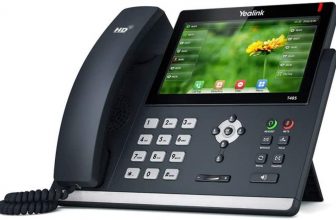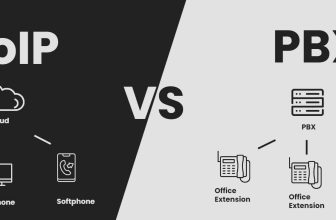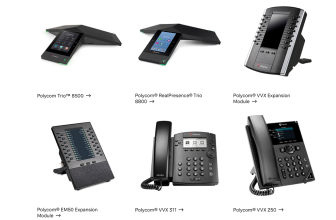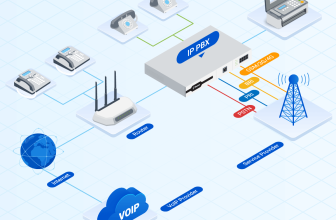Question: What is a Business Landline?
Common Asked Question
A business landline is commonly associated with a phone system connecting communications from the caller to the receiver. Businesses typically chose between having a traditional landline phone services (cable or hard-wired) or a business landline phone service Voice Over Internet Protocol or basically through the web/cloud (VoIP) offering enhanced call features as a tool for doing business.
For most businesses, the phone number is customized to compliment the company’s brand recognition (history and longevity). In some cases, it’s an essential business element for building a reputable standing in a local region or specialized market. For this reason, most companies prefer to keep the existing phone number no matter where they are doing business.
In today’s business arena as companies venture into other markets and regions, they need a solution that allows them to keep the branded phone number working. Thanks to VoIP technology, the solution is a business landline phone service offering the option to move and integrate an existing number into the new business phone service. Switching from a landline vs VoIP brought another more substantial change for businesses looking to improve how they connect. Unlike landlines, VoIP allows businesses to work remotely through mobile and desktop apps, voicemail and email messages. It changed the workforce dynamics allowing calls to be sent and received from literally anywhere in the world. Given the current Covid-19 world we live in, having adaptability for work to continue even if from the office of our homes, VoIP gives this kind of flexibility.
But with all of the positives, there is still a hesitation to switch phone services. The concerns are associated with business interruptions and the financial costs of changes to the internal communication system. Turns out that a VoIP service offers companies cost-savings benefits, quality call features and upgrades to the system.
Traditional phone service functions have built a strong following based on its reliability. Despite the technological upgrades, landlines have held a position of influence in the communication and business industries. Transmitting a caller’s voice using fiberoptic cables (dedicated line) landlines have been the fundamental source of communications linking customers, businesses, and internal business groups. Functionally, it’s been useful but limited to the needs of the current business practices.
Today, the combination of communications and technology remains an essential business tool for changing how companies engage connections. Customers like businesses have thrived on the current technological evolutions and naturally expect the next innovation from business phone service providers.
Adding to the merit of traditional landlines, business landlines share the same business approach. What changes is how the technology performs the function. VoIP services encode a caller’s voice to transmit it over the internet. The process enhances movement and speed within a secured environment, allowing the call to connect faster, making the system more responsive and less costly.
Variances between landline and business VoIP landline include:
- Higher setup cost to landline vs VoIP services.
- Regular phone services charge per minute for long-distance calling.
- VoIP has a single fee for network access – cost savings.
- Tradition phone service is tied to the office location.
- VoIP allows integration of multiple devices to carry the number.
As VoIP integrates technology seamlessly, it helps to make the business process more manageable while responding to requests to conduct business anywhere 24/7. Companies looking to keep pace with the changing trends need to upgrade or replace their traditional systems with a business phone service, utilizing its innovative technology features.
Choosing the right landline vs VoIP provider isn’t just about picking the cheapest landline phone service or the best landline phone service. It’s about choosing a partner that continuously monitors technology for the sole purpose of proposing a better way to do business. As part of a VoIP strategy, scalable communication levels are an integral response feature to business and customer demands. VoIP presents a distinct solution for making it easy to set up a business account.
Business, client, or customer inquiries are easily managed as companies share information throughout departments via unified communications. Whether callers chose mobile chats, email, or conference calls, each feature is synchronized to function:
- Caller ID and Waiting ID – incoming name and number.
- Call Waiting – Choose a unique tone distinguishing the type of call while engaged with a call.
- Call Park – Option to hold calls, and switch devices to take incoming call.
- Call Forwarding – Never miss a call again – route using auto attendant.
- Call Screening – Easily reject, block call numbers, or callers.
Technology isn’t entirely about systems, software, and hardware. It allows users to personalize call feature options individually:
- Ring tone distinctions – create incudal call ring tones.
- Three-way Calling – Three party conference call.
- Do Not Disturb – Prevent distractions or advise callers of availability.
- Speed Dialing – Dial friends, family, and colleagues instantly
Regardless of the benefits, a VoIP phone service is a significant business element integrating technology’s constant change to boost business performance.
Business landline phone service offers affordable nationwide and international calling plans. VoIP plans are raising company communication standards to meet modern-day business demands and establishing virtual presence in selected market segments. Successful enterprises are taking advantage of the technological benefits to service customers professionally and proficiently. Why? Because there’s not a business today that doesn’t depend on customer loyalty for its revenue.
Choosing landline vs VoIP options:
- Traditional phone technology is limited to making and receiving voice calls.
- VoIP plan comes with various built-in call features.
- Add-ons or upgrades can be costly with conventional phone systems.
As technology continues to emerge, businesses need innovative tools that align with the speed of business development and customer demands. Having the technology available before it’s needed is what experienced VoIP providers do, so companies can focus on business.
Changes for better business incorporate:
- More efficiency by automating phone communications.
- Streamlining the day-to-day communication processes.
- Optimizing customer, office, and remote interactions with unified communications.
- Reduced response time, increasing customer expectations, and business productivity.
With the current economic issues, more and more companies are finding it necessary to push the business boundaries with the help of VoIP providers to keep their operations up and running. This year, businesses will transform how they do business using quality business connections and call feature services as our nation works toward getting back to normal.
VoIP is the foundation of modern business phone services. Like good business practices, business landline phone service requires participation and monitoring of performance and systems. As real-time business activities become the new- norm, more and more companies are choosing to switch from a regular phone services to VoIP.
Although, the process can be overwhelming for businesses transitioning to a VoIP phone service – the process is planned and executed with precision. It starts with the provider reviewing the company’s existing infrastructure to determine its service needs to implement the selected call features. The transition is strategically arranged to ensure service integrity, and call quality without any interruption to the operations.
Transition previews involve:
- Existing phone number or local number requirements.
- Technical interfaces to work with the existing network.
- Virtual mobility and multiple device capability.
- Backup plans in the event of uncontrollable events causing interruptions.
- Long-term planning identifying changes to support business growth.
Are you looking for high quality, secured, and a low-cost business landline solution? Why not consider the attributes of VoIP. Traditional phones systems can be costly depending on the number of lines, selection of business call features and mobility.









